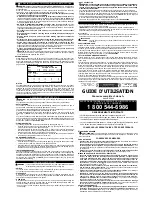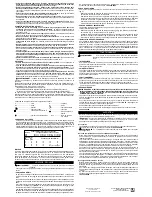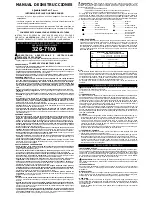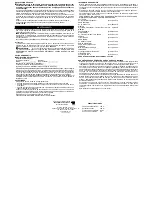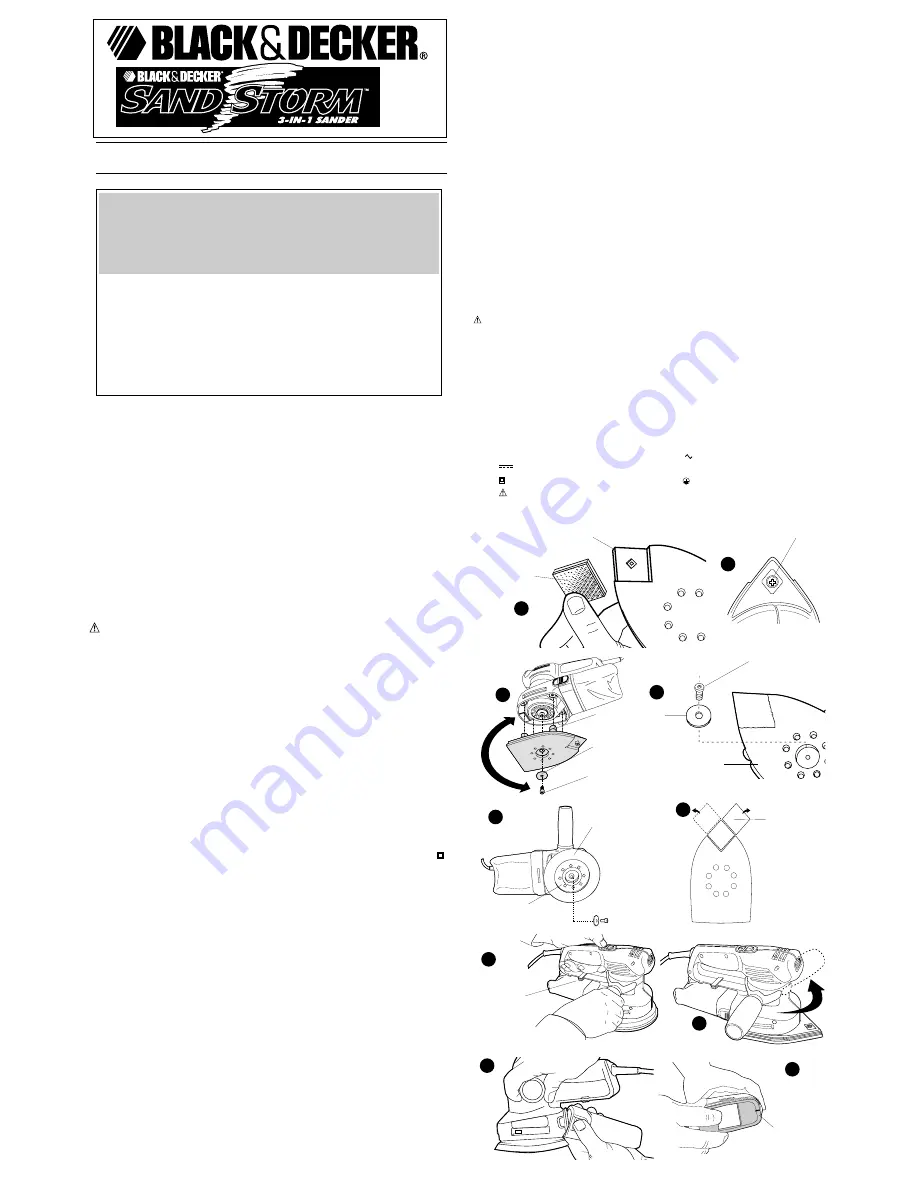
GENERAL SAFETY RULES
WARNING! Read and understand all instructions. Failure to follow all instructions listed
below may result in electric shock, fire and/or serious personal injury.
SAVE THESE INSTRUCTIONS
Work Area
• Keep your work area clean and well lit. Cluttered benches and dark areas invite accidents.
• Do not operate power tools in explosive atmospheres, such as in the presence of
flammable liquids, gases, or dust. Power tools create sparks which may ignite the dust or
fumes.
• Keep bystanders, children, and visitors away while operating a power tool.
Distractions can cause you to lose control.
Electrical Safety
• Grounded tools must be plugged into an outlet properly installed and grounded in
accordance with all codes and ordinances. Never remove the grounding prong or
modify the plug in any way. Do not use any adaptor plugs. Check with a qualified
electrician if you are in doubt as to whether the outlet is properly grounded. If the tools
should electrically malfunction or break down, grounding provides a low resistance path to
carry electricity away from the user. Applicable only to Class I (Grounded) tools.
• Double insulated tools are equipped with a polarized plug (one blade is wider than the
other.) This plug will fit in a polarized outlet only one way. If the plug does not fit fully
in the outlet, reverse the plug. If it still does not fit, contact a qualified electrician to
install a polarized outlet. Do not change the plug in any way. Double Insulation
eliminates the need for the three wire grounded power cord and grounded power supply
system. Applicable only to Class ll tools.
• Avoid body contact with grounded surfaces such as pipes, radiators, ranges and
refrigerators. There is an increased risk of electric shock if your body is grounded.
• Don’t expose power tools to rain or wet conditions. Water entering a power tool will
increase the risk of electric shock.
• Do not abuse the cord. Never use the cord to carry the tools or pull the plug from an
outlet. Keep cord away from heat, oil, sharp edges or moving parts. Replace damaged
cords immediately. Damaged cords increase the risk of electric shock.
• When operating a power tool outside, use an outdoor extension cord marked “W-A”
or “W.” These cords are rated for outdoor use and reduce the risk of electric shock.
Personal Safety
• Stay alert, watch what you are doing and use common sense when operating a power
tool. Do not use tool while tired or under the influence of drugs, alcohol, or
medication. A moment of inattention while operating power tools may result in serious
personal injury,
• Dress properly. Do not wear loose clothing or jewelry. Contain long hair. Keep your
hair, clothing, and gloves away from moving parts. Loose clothes, jewelry, or long hair
can be caught in moving parts. Air vents cover moving parts and should be avoided.
• Avoid accidental starting. Be sure switch is off before plugging in. Carrying tools with
your finger on the switch or plugging in tools that have the switch on invites accidents.
• Remove adjusting keys or wrenches before turning the tool on. A wrench or a key that is
left attached to a rotating part of the tool may result in personal injury.
• Do not overreach. Keep proper footing and balance at all times. Proper footing and
balance enables better control of the tool in unexpected situations.
• Use safety equipment. Always wear eye protection. Dust mask, non-skid safety shoes,
hard hat, or hearing protection must be used for appropriate conditions.
Tool Use and Care
• Use clamps or other practical way to secure and support the workpiece to a stable
platform. Holding the work by hand or against your body is unstable and may lead to loss of
control.
• Do not force tool. Use the correct tool for your application. The correct tool will do the
job better and safer at the rate for which it is designed.
• Do not use tool if switch does not turn it on or off. Any tool that cannot be controlled with
the switch is dangerous and must be repaired.
• Disconnect the plug from the power source before making any adjustments,
changing accessories, or storing the tool. Such preventive safety measures reduce the
risk of starting the tool accidentally.
• Store idle tools out of reach of children and other untrained persons. Tools are
dangerous in the hands of untrained users.
• Maintain tools with care. Keep cutting tools sharp and clean. Properly maintained tools,
with sharp cutting edges are less likely to bind and are easier to control.
• Check for misalignment or binding of moving parts, breakage of parts, and any other
condition that may affect the tools operation. If damaged, have the tool serviced
before using. Many accidents are caused by poorly maintained tools.
• Use only accessories that are recommended by the manufacturer for your model.
Accessories that may be suitable for one tool, may become hazardous when used on
another tool.
Service
• Tool service must be performed only by qualified repair personnel. Service or
maintenance performed by unqualified personnel could result in a risk of injury.
• When servicing a tool, use only identical replacement parts. Follow instructions in the
Maintenance section of this manual. Use of unauthorized parts or failure to follow
Maintenance Instructions may create a risk of electric shock or injury.
WARNING:
Some dust created by power sanding, sawing, grinding, drilling, and other
construction activities contains chemicals known to cause cancer, birth defects or other
reproductive harm. Some examples of these chemicals are:
• lead from lead-based paints,
• crystalline silica from bricks and cement and other masonry products, and
• arsenic and chromium from chemically-treated lumber. (CCA)
Your risk from these exposures varies, depending on how often you do this type of work. To
reduce your exposure to these chemicals: work in a well ventilated area, and work with
approved safety equipment, such as those dust masks that are specially designed to filter
out microscopic particles.
The label on your tool may include the following symbols.
V ..........................volts
A..........................amperes
Hz ........................hertz
W ........................watts
min ........................minutes
......................alternating current
......................direct current
no ........................no load speed
..........................Class II Construction
........................earthing terminal
........................safety alert symbol
.../min ..................revolutions or
reciprocations
per minute
VEA EL ESPAÑOL EN LA CONTRAPORTADA.
SAVE THIS MANUAL FOR FUTURE REFERENCE.
INSTRUCTIVO DE OPERACIÓN, CENTROS DE SERVICIO Y PÓLIZA
DE GARANTÍA. ADVERTENCIA: LÉASE ESTE INSTRUCTIVO ANTES
DE USAR EL PRODUCTO.
CAT. NO. RO600 FORM NO. 375886-00 (AUG-01) COPYRIGHT 2001 PRINTED IN ENGLAND
KEY INFORMATION YOU SHOULD KNOW:
• Regularly check wear on paper and replace worn paper.
• The black pads are not abrasive surfaces–do not use this tool without properly
attaching sandpaper to the pad.
• When changing pads, ensure the posts of the detail/finishing pad are installed
properly before tightening the bolt (Fig. 3).
INSTRUCTION MANUAL
1-800-54-HOW-TO
BEFORE RETURNING THIS PRODUCT
FOR ANY REASON PLEASE CALL
IF YOU SHOULD EXPERIENCE A PROBLEM
WITH YOUR BLACK & DECKER PURCHASE,
CALL 1-800-54-HOW-TO (1-800-544-6986).
IN MOST CASES, A BLACK & DECKER REPRESENTATIVE
CAN RESOLVE YOUR PROBLEM OVER THE PHONE.
IF YOU HAVE A SUGGESTION OR COMMENT,
GIVE US A CALL. YOUR FEEDBACK IS VITAL
TO THE SUCCESS OF BLACK & DECKER’S QUALITY
IMPROVEMENT PROGRAM.
(544-6986)
Catalog No.
RO600
1
Detail sanding tip
Pointe de ponçage de détail
Punta para lijado de detalles
Platen
Plaque
Placa
Rotate tip completely (180°)
Faire tourner la pointe
complètement (180°)
Gire la punta completamente (180°)
Screw
Vis
Tornillo
2
3
Posts
Tiges
Postes
Bolt
Boulon
Tornillo
Washer
Rondelle
Roldana
4
Bolt
Boulon
Tornillo
Washer
Rondelle
Roldana
Sanding pad
Tampon de ponçage
Base de lijado
5
Random orbit sanding pad
Tampon de ponçage orbital excentrique
Base de lijado de órbita
Channel
Voie
Canal
6
Detail sanding tips
Pointes de ponçage de détail
Puntas de lijada a detalle
7
Hex wrench storage
Clé hexagonale
llave allen
8
9
10
Interior baffle
Chicane intérieure
Baffle interior


